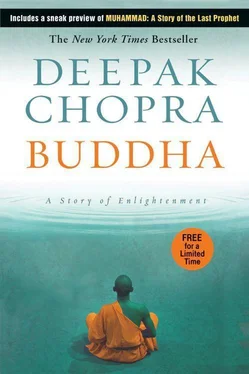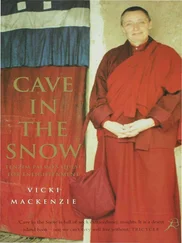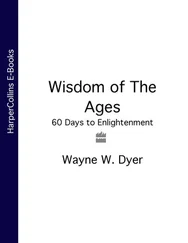With these incentives, his men fought hard, and it was lucky, despite many gruesome wounds, that nobody was killed. Nobody, that is, until the time came for mounted archery. This was the most spectacular of the combats. Siddhartha had participated vigorously in sword fighting but had otherwise remained on the periphery. Now it was his turn to show his true mettle. On one side of the field nine archers were lined up on horseback. Siddhartha faced them alone on Kanthaka. One by one the archers would peel off and charge at Siddhartha, firing arrows as rapidly as they could. Siddhartha’s goal was to knock each opponent off his horse while escaping the arrows.
The crowd grew hushed. This was a test of skill no pampered son of a king could pass unless he was born to fight, and although the arrows had been blunted enough not to pierce the prince’s armor, he couldn’t be totally protected. The spectators gasped when Siddhartha, in a show of bravado, took off his helmet and threw it to the ground. The crowd applauded, but then he went further and unstrapped his broad chest plate, letting it fall away. Everyone went into shock, including the king. Suddhodana leaped to his feet, ready to call a halt to the games, but he knew he couldn’t. The humiliation would wipe out everything he had tried to achieve for the past week. Was Siddhartha desperate to show his worthiness? Whatever his motive, Suddhodana recognized the necessity of what his son had done: mock battles could only frighten people so far and no farther unless lethal danger was involved.
The first archer peeled off and rode at a hard gallop toward Siddhartha, who kicked Kanthaka in the side and charged to meet him. Both men shot their first arrow at the same time. The one aimed at Siddhartha grazed his leggings, while his arrow flew true-the horseman was hit in the middle of his chest and fell from the saddle. At that moment the second archer peeled off, raising his bow. Siddhartha quickly found a new arrow from the quiver over his shoulder and prepared to fire again.
In his mind he was clear why he had removed his helmet and chest plate. Only by exposing himself to real threat could Siddhartha feel he wasn’t participating in a charade. If he was ever to be a real warrior, it must begin today. He fired, and again his arrow found its mark; the second archer toppled to the ground with a blow to the chest. Siddhartha wheeled Kanthaka around. The stallion wasn’t panting yet, but there were seven more to go.
“Come at me harder!” he shouted across the field. “Anyone who draws my blood will be forgiven by the king, if he fights fair.” This was a lie, but Siddhartha had seen the nervous glances being exchanged by the archers when he threw off his armor. Goaded on now, his adversaries wanted to prove to the king that they were the best. The next two men charged faster and aimed better. But Siddhartha had taken his training seriously, and he had talent on horseback. When his next arrow missed, he kept his cool and fired again, unhorsing his opponent when they were within a few yards of each other. The crowd grew more impressed, and by the time Siddhartha was down to the last two archers, they were on their feet cheering in earnest.
Kanthaka’s sides were heaving now, and Siddhartha felt a little giddy. He had eaten nothing that morning, and the constant wheeling and maneuvering were making his surroundings whirl. He braced himself because the end of the combat was the toughest part. The last two archers charged him together. Siddhartha had an arrow ready, but his nerves got the better of him and it flew well right of the man he aimed at. His hand fumbled for another arrow.
The bolder of the archers had already gotten off two shots, and the second one was lucky-it found a gap in the padded blankets that protected Kanthaka’s front, deeply piercing the horse’s skin. Siddhartha felt the animal rear and barely kept his seat. He pulled tight on the reins and closed his thighs around the animal, willing it to calm down and forget its fear. Kanthaka held on, galloping straight for the double enemy, who now closed in, one on each side.
They were too close for Siddhartha to get any arrows off. He heard a cacophony of hoofbeats against the packed earth, and his eyes blurred. He shook his head, and he saw Mara riding behind one of the archers, clutching his arms around the rider’s waist. The demon was laughing, and then he suddenly disappeared. Siddhartha didn’t have much time to refocus his sight. He ducked down close to his saddle as the two enemies whipped past him on either side. They fired, and Siddhartha was fortunate. The arrows flew over his body with a swish of air, missing him.
He wheeled around, and regaining his self-possession, he fired rapidly, first at the back of one horseman, then at the other. His timing was perfect. They were still struggling to turn their mounts around when his arrows hit them, and both men fell. Siddhartha had fired so rapidly that they seemed to go down simultaneously. The crowd roared. For the first time in his life Siddhartha felt exulted by battle; he rose in his stirrups and acknowledged the accolades. This was something, the first thing, he had earned for himself.
But despite his triumph, Mara’s laughter rang in his ears. Siddhartha was disoriented, and he scanned the tournament field. Only one of the archers had gotten to his feet. The other lay on the ground writhing in agony. Siddhartha jumped down and ran over to him. He saw with horror that the man had been hit in the throat, the arrow’s point coming out the back of his neck.
Arms lifted the wounded man to a sitting position, hands tried to dislodge the arrow. He groaned and almost passed out. Siddhartha’s head swam in the confusion. He was dimly aware that someone broke off the arrow’s tip so that the shaft could be pulled through the man’s neck, but this caused a tremendous gush of blood, which shot so far that it hit Siddhartha in the chest.
“Do something,” he pleaded, aware in the midst of everything that his voice sounded high and panicky, more a boy’s voice than a man’s. He looked up to see that the king had arrived. The soldiers parted for him. His father barked for someone to fetch a physician, but by that time the wounded man had lost consciousness, his head limply tilted to one side like a broken doll’s. From the fountain of blood still erupting, but with weaker and weaker force, it was obvious he was lost. Suddhodana pulled out a silk kerchief and pressed it to the man’s wound.
“Did you know him?” asked Siddhartha, although he had no idea why that would matter. His father grimly shook his head. The presence of death quieted the bystanders, until a new voice broke the silence.
“Amazing. Someone was actually hurt. Fire the stagemaster.”
Devadatta pushed his way through the packed bodies surrounding the corpse. He stared at it coldly. “It’s his own fault for missing his cue, isn’t it?” He turned to Siddhartha, whose whole body was shaking. “You couldn’t have fought for real, I can see that.”
The bystanders were shocked, waiting for the king to explode with rage, but Suddhodana kept silent. His guilt told him that Devadatta was right-nobody was meant to get hurt when the prince was involved. He gazed at his son, and Siddhartha instantly read the truth.
Siddhartha willed himself to stop shaking and got to his feet. He drew his sword, glaring at Devadatta. “You said you wanted to fight me today. I accept your challenge.”
“No!”
For a moment it sounded as if his father had shouted, but Channa stepped through the crowd. “No, I’ll fight the bastard. It’s about time.” Channa took two strides, raising his fist to take a swing at Devadatta. But in his wildness he lost his balance, and the blow only grazed Devadatta’s cheek.
Devadatta spit on his palm and wiped his cheek with a look of disgust, as if it were covered with excrement.
Читать дальше












